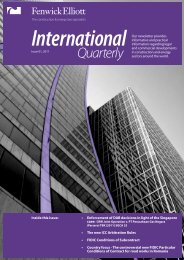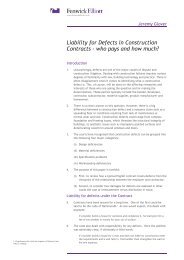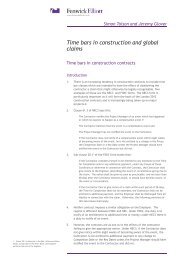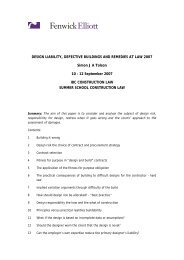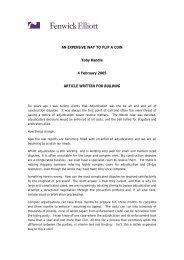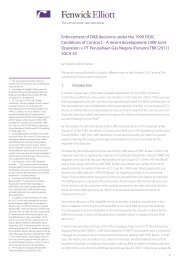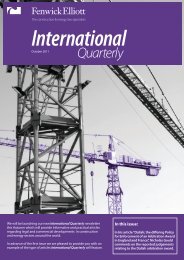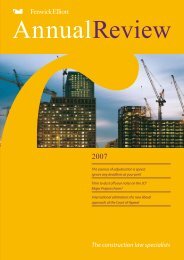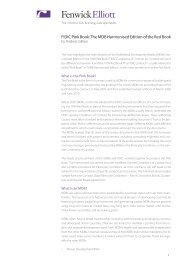CRW Joint Operation v. PT Perusahaan Gas Negara - Fenwick Elliott
CRW Joint Operation v. PT Perusahaan Gas Negara - Fenwick Elliott
CRW Joint Operation v. PT Perusahaan Gas Negara - Fenwick Elliott
Create successful ePaper yourself
Turn your PDF publications into a flip-book with our unique Google optimized e-Paper software.
Commentary:<br />
International dispute resolution & arbitration Issue 01 Winter 2011<br />
request the attendance of a party<br />
representative at a case management<br />
conference, the intention being to secure<br />
the parties ‘buy in’ to effective case<br />
management procedures.<br />
Appendix IV provides examples of case<br />
management techniques that might be<br />
adopted. None of the proposals in this<br />
appendix are in themselves radical, but<br />
the appendix provides a useful list of<br />
possible case management techniques.<br />
The list includes various proposals aimed<br />
at limiting disclosure, and looking for<br />
areas where the parties or their experts<br />
might agree, limiting the length of<br />
written submissions and evidence, and<br />
looking at bifurcation, the use of IT, and<br />
giving consideration to whether there<br />
are issues that might be decided on a<br />
documents only basis. It also includes<br />
encouragement to the parties to consider<br />
settlement.<br />
The case management provisions<br />
conclude at Article 27, where a new<br />
obligation is placed upon the Tribunal: at<br />
the conclusion of the proceedings, when<br />
the Tribunal declares the proceedings<br />
closed, the Tribunal must now also inform<br />
the Secretariat and the parties of the date<br />
by which the Tribunal expects to submit<br />
its draft award to the Court for approval.<br />
Emergency Arbitrator<br />
Whilst the 1998 Rules made provision<br />
for the issue of interim or conservatory<br />
measures by the Tribunal once<br />
established, they did not provide a<br />
mechanism for urgent application<br />
pending the Tribunal being constituted.<br />
Consequently parties with an ICC<br />
arbitration clause would have to look<br />
to local courts for any urgent interim or<br />
conservatory measures, or wait for the<br />
Tribunal to be constituted – a process that<br />
could take several months.<br />
The new Rules however now provide,<br />
at Article 29 and Appendix 5, for the<br />
appointment of an Emergency Arbitrator<br />
to make orders for urgent interim or<br />
conservatory measures, a procedure that<br />
has been included in a number of other<br />
administered arbitral rules (the SIAC and<br />
Stockholm rules being examples).<br />
Appointment of the Emergency Arbitrator<br />
is made upon request to the Secretariat<br />
(Article 29(1)). The request must be made<br />
before the transmission of the file to the<br />
Tribunal if a Request for Arbitration has<br />
already been lodged. The appointment<br />
is made by the President of the ICC Court,<br />
who also decides whether the emergency<br />
provisions apply. Further the fee ($40,000)<br />
must be paid before the application will<br />
be notified to the Parties under Appendix<br />
IV Article 2, and the emergency procedure<br />
commenced.<br />
The Emergency Arbitrator must act fairy<br />
and impartially, and allow each party<br />
reasonable opportunity to present its case<br />
(Appendix IV, Article 5 (2)). By Appendix IV,<br />
Article 6(4) the Emergency Arbitrator must<br />
send his order to the Parties within 15<br />
days from the date the file is transmitted<br />
to him, and the date of transmission<br />
is expected to be on the emergency<br />
arbitrators appointment, which should<br />
be within two days of the request for the<br />
appointment having been made (2(1)).<br />
If a Request for Arbitration has not<br />
already been made by the party<br />
seeking the urgent interim relief, that<br />
Request must be made within 10 days<br />
of making application, failing which the<br />
President must terminate the emergency<br />
proceedings (Appendix IV, Article 1 (6)).<br />
It is important to note that by Article 29(2),<br />
the emergency arbitrator’s decision takes<br />
the form of an order, and not an award,<br />
and by Article 29(3) does not bind the<br />
Tribunal ultimately established to resolve<br />
the dispute. It is not therefore in the<br />
nature of a final, binding decision of an<br />
arbitrator, with the result that it is unlikely<br />
to be enforceable as an arbitrator’s award.<br />
Its “teeth” however, are found in the power<br />
given at Article 29(4) to the Tribunal<br />
appointed to determine the dispute,<br />
to decide upon any claims relating to<br />
the emergency arbitrator proceedings.<br />
Noncompliance with an emergency<br />
arbitrator’s order could, therefore, result in<br />
a claim.<br />
It is also important to note that the Parties<br />
are expressly given the option to opt-out<br />
of these provisions. As arbitration is a<br />
process born of contract, parties could, by<br />
agreement, say that any particular parts of<br />
the Rules do not apply, but if that included<br />
rules which the ICC Court considers<br />
fundamental to ICC arbitration, then the<br />
ICC Court would decline to administer<br />
the arbitration. Whether the emergency<br />
arbitrator procedure might be regarded as<br />
fundamental is not known, but the Parties<br />
have been given the express right to opt<br />
out should they so choose.<br />
Further, by Article 29(6), these provisions<br />
will not apply to arbitration agreements<br />
entered onto before 1 January 2012,<br />
and by Article 29(7), it is not intended to<br />
prevent a party applying to local courts for<br />
interim or conservatory relief.



